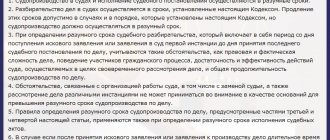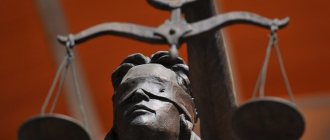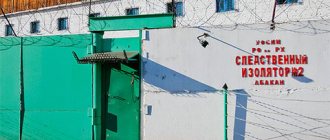Legal advice > Entrepreneurial activity > Crimes in the economic sphere, their characteristics and examples
With the emergence of a market economy in the world, there was a need to ensure additional criminal control over the activities of organizations. Examples of economic crimes include both illegal business and deliberately false advertising. Most often, people who have been victims of economic fraud for a long time cannot understand that they have fallen for scammers, so it is important to have an idea of possible economic crimes and ways to control crime in this area.
The concept of crimes in the economic sphere
Let's start with the main thing - with definitions. The general definition of crime established by criminal law is formulated as follows. An economic crime is a socially dangerous act committed guilty of guilt, prohibited by the Criminal Code of the Russian Federation (hereinafter referred to as the Criminal Code of the Russian Federation) under threat of punishment. If everything is more or less clear with guilt and prohibition, then the concept of public danger raises questions.
Social danger is a material sign of a crime that reveals its social essence. It manifests itself in the fact that a socially dangerous act causes harm or creates a threat of harm to an individual, society or the state. The law does not contain a detailed list of those groups of social relations that are taken under the protection of criminal law. The types of these social relations can be seen in Article 2 of the Criminal Code of the Russian Federation: protection of human and civil rights and freedoms, property, public order and public safety, the environment, the constitutional system of the Russian Federation from criminal attacks, ensuring peace and security of mankind, as well as crime prevention.
For the purposes of this article, establishing an understanding of public danger seems to me to be of key importance.
Limitation periods for economic crimes
In accordance with Art. 78 of the Criminal Code of the Russian Federation, the statute of limitations for financial crimes expires depending on the severity of the offense committed:
- minor crime – 2 years;
- crime of average gravity – 6 years;
- felony - 10 years;
- especially serious crime – 15 years.
For persons who have committed an international economic crime or a crime against society as a whole, statutes of limitations do not apply.
The expiration of the statute of limitations may be suspended if the person who committed the economic offense evades criminal liability.
As you know, “easy” and big money have two sides of the coin: on the one hand, it’s quick money, on the other, there are problems with law enforcement agencies. Before you take this criminal path, think about all the possible consequences.
Signs
If we approach it formally, then economic crimes are highlighted by the Criminal Code of the Russian Federation in section No. VIII. That’s what it’s called: Economic Crimes. In turn, the section contains three chapters: crimes against property, in the field of economic activity, against the interests of service in commercial and other organizations.
The main object of economic crimes is the procedure established by law for carrying out entrepreneurial, financial and other economic activities regarding the production, distribution, exchange and consumption of material goods and services, the property of individuals or legal entities.
Criminal cases for economic crimes can be initiated in a public manner, regardless of the will of the victim, or in a private-public manner, at the request of the victim, but without the possibility of ending the criminal prosecution in connection with the reconciliation of the parties.
Economic crime investigation
Recent studies in the field of economic offenses have shown that fraud is the most common case in Russia - the number of cases initiated under this article is almost 2 times higher than for other offenses (with the exception of theft and trafficking in drugs and illegal drugs).
The work of uncovering economic crime is carried out by special units of the Ministry of Internal Affairs of the Russian Federation. Each division has its own departments for uncovering atrocities in various fields of human activity - mechanical engineering, metallurgy, agriculture, etc. If we are talking about a threat to the state, then the FSB of the Russian Federation gets involved in the work.
Watch a video about the peculiarities of the methodology for investigating bribery and other official crimes:
Economic crimes: classification
Economic crimes can be roughly classified as follows:
1) crimes against the general procedure for carrying out internal economic activity - crimes consisting of illegal refusal of state registration of a legal entity or issuance of a license, manipulation of the real estate register, illegal entrepreneurship without state registration, production of unlabeled products, etc. (Articles 169, 170 , 170.1, 170.2, 171, 171.1, 171.2, 172, 172.2, 173.1, 173.2, 174, 174.1, 175, 185.6, 191.1, 200.3 of the Criminal Code of the Russian Federation);
2) crimes against the lending procedure and the procedure for satisfying creditors' claims - illegal receipt of a loan when the information provided to the bank does not correspond to reality, deliberate bankruptcy, malicious evasion of repayment of accounts payable, i.e. there is money, but does not pay (Article 172.1, 176, 177, 195, 196, 197 of the Criminal Code of the Russian Federation);
3) crimes against fair competition, such as restriction of competition - illegal exclusion from trading, coercion to complete a transaction, illegal receipt and disclosure of commercial and tax secrets, etc. (Articles 178, 179, 180, 181, 183, 184, 185.3, 185.6 of the Criminal Code of the Russian Federation);
4) crimes against the procedure for the circulation of money, precious metals, precious stones and securities, as well as the procedure for recording rights to securities. A typical example is the failure of the depositary to enter information about the pledge of shares into the register of share owners (Article 170.1 (in terms of manipulations with the register of securities owners and the depositary accounting system), Articles 185, 185.1, 185.2, 185.4, 186, 187, 191 , 192 of the Criminal Code of the Russian Federation);
5) crimes against the procedure for carrying out foreign economic activity - transporting cash across the border without declaration, for example (Articles 189, 190, 193, 193.1, 194, 200.1, 200.2 of the Criminal Code of the Russian Federation);
6) crimes against the procedure for paying taxes and fees. An exemplary crime in this area is concealing money or property from tax collection (Articles 198, 199, 199.1, 199.2 of the Criminal Code of the Russian Federation).
Now it's time to move on to the main subject of our article. How to act when carrying out economic activities to avoid unpleasant consequences.
Legal representation in court
Take advantage of free assistance from an experienced lawyer using the link below.
Consultation is possible online or in our Moscow office. ASK AN EXPERT
First line of defense
Despite the fact that companies potentially have a high risk of facing economic crimes against them, it is necessary to fight them. Moreover, a line of defense can be built before the crime is committed. First, you should check the operating rules in force within the company. It is necessary to make control over the disposal of inventory items more stringent and at the same time transparent. Next, it is necessary to study the job descriptions of employees and exclude the possibility of one employee having exclusive rights to dispose of the company’s material and financial resources.
Albert Nagayev advises:
For example, invoices for payment or expense vouchers must be approved by two different officials.
It is worth paying attention to the selection of new employees, studying resumes more carefully, and selectively confirming the information contained in them.
After the audit of activities, it is necessary to create new internal regulations regulating various areas of the company’s economic life, including the reception and accounting of commodity and material assets, collection rules, quality of security of protected information, compliance with employee safety, work with contractors, verification of business partners, compliance .
Igor Bederov advises:
Most risks can be prevented precisely through well-structured regulatory mechanisms, as well as through the implementation of control over their compliance. This is important, because if there is no control, then there is no point in creating regulations “on paper”.
One of the typical and very common mistakes that lead to problems in combating crimes is the careless execution of written documents on transactions or their poor elaboration, for example, in the case when a company is preparing for a transaction with a business partner with whom it has been working successfully for a long time.
Tatyana Bakuleva comments:
Often businessmen do not draw up basic receipts for the transfer of money, and even if some papers are drawn up, their contents are not given due attention, which leads not only to the commission of fraud, but also to subsequent difficulties in proving the crime.
Subscribe to the magazine “Calculation” or “Calculation. Premium" for the 1st half of 2022!
Differences between a civil offense and a crime in the economic sphere
In this section we will not consider obvious crimes such as theft, use of false documents, misappropriation or embezzlement, and the like. In other words, crimes, the composition of which is obvious. Of much greater interest are crimes whose classification is ambiguous and requires analysis.
Let's look at two typical examples: fraud and tax evasion.
Fraud
The crime called fraud is provided for in Article 159 of the Criminal Code of the Russian Federation. Fraud is defined as the theft of someone else's property or the acquisition of rights to someone else's property through deception or breach of trust.
What is important is that in this definition, to separate economic relations from criminal ones, there are actions: theft, deception or abuse.
Theft is understood as illegal actions committed for mercenary purposes, gratuitous seizure and (or) conversion of someone else's property in favor of the perpetrator or other persons who caused damage to the owner or other holder of this property.
Deception, as a method of committing theft or acquiring the right to someone else's property, may consist in the deliberate communication of knowingly false information that does not correspond to reality, or in silence about true facts, or in deliberate actions aimed at misleading the owner of the property or another person.
Abuse of trust in fraud is the use for personal gain of a trust relationship with the owner of property or another person authorized to make decisions on the transfer of this property to third parties. Trust can be conditioned by various circumstances, for example, the official position of a person or his personal relationship with the victim.
Let's look at an example that entrepreneurs encounter almost every day. This is a failure to fulfill contractual obligations. Organization 1 paid an advance to Organization 2 for the supply of goods. Organization 2 did not fulfill its delivery obligations and did not return the advance payment. How to qualify these actions? The most important circumstance that needs to be established is the goal of Organization 2, or more precisely its leadership and/or owners. If the obligations are not fulfilled due to objective circumstances of economic activity (for example, the supplier of Organization 2 did not supply the raw materials necessary to fulfill the order of Organization 1), then this is a civil legal relationship. Organization 1 should apply to the arbitration court to protect its rights.
Now let's imagine the same situation, but with an addition. The owner of Organization 2's supplier is the director of Organization 2. After the supplier received an advance from Organization 2, the supplier withdrew all the money to its owner.
The director of Organization 2, with the intention of stealing funds from the organization he led, created a supplier, entered into an agreement with him, transferred an advance and transferred the money to his own property. All the signs of fraud are evident: gratuitous withdrawal of funds for the mercenary purpose of personal enrichment through abuse of trust due to official position.
Tax evasion
According to Article 199 of the Criminal Code of the Russian Federation, a crime is considered to be “evasion of taxes, fees payable by an organization, and (or) insurance premiums payable by an organization, by failure to submit a tax return (calculation) or other documents, the submission of which is in accordance with the legislation of the Russian Federation on taxes and fees is mandatory, either by including in a tax return (calculation) or such documents deliberately false information committed on a large scale.”
At first glance, everything is clear, if not for the last phrase about the inclusion of deliberately false information.
Suppose an organization includes in its income tax return a certain amount reduced by the amount of expenses. As a result of a subsequent audit by the tax authority, the latter accrued an additional amount of profit because it did not recognize some expenses as complying with tax legislation. And, moreover, this decision of the tax authority was later confirmed by the court.
In this situation you need to have the following. Methods of evading the payment of taxes, fees, and insurance premiums are actions consisting of deliberate inclusion in a tax return (calculation) or other documents, the presentation of which in accordance with the legislation of the Russian Federation on taxes and fees is mandatory, knowingly false information , or inaction, expressed in deliberate failure to submit a tax return (calculation) or other specified documents. Deliberate inclusion of knowingly false information is a stumbling block. Knowingly false information is information that the taxpayer knew about before being submitted to the tax authority. For example, income tax calculations include expenses that were not actually incurred. Very important: not those expenses that the organization actually incurred and included in the tax reduction, but which were subsequently recognized by the tax authority as not meeting the requirements of the law in terms of reducing profits. Namely, not produced. That is, there was deception. The same situation applies to VAT or any other taxes.
Legal entity as a group of persons. Article 210 of the Criminal Code of the Russian Federation
“Creating a criminal organization for the purpose of committing one or more grave or especially grave crimes, or managing a criminal organization or its structural units, as well as coordinating the actions of organized groups, creating stable connections between them, developing plans and creating conditions for the commission of crimes by organized groups , division of criminal proceeds between such groups.”
Isn't that an excellent definition of a legal entity? Only this is the plot of Article 210 of the Criminal Code of the Russian Federation, which defines the concept of a criminal community.
In other words, under conditions determined by law, an organization can be recognized as a criminal community, and responsibility for crimes increases significantly.
The edition of the Criminal Code, which entered into force on April 1, 2022, supplemented Article 210 with a note according to which “the founders, participants, managers, members of management bodies and employees of an organization registered as a legal entity, and (or) managers, employees of its structural division are not subject to criminal liability for of this article only due to the organizational structure of the organization and (or) its structural unit and the commission of any crime in connection with the exercise of their powers to manage the organization or in connection with the organization’s implementation of entrepreneurial or other economic activities, except when these the organization and (or) its structural unit were knowingly created to commit one or more grave or especially grave crimes.”
This note somewhat clarified the situation and eased the situation for legal entities, but still left the assessment category.
Author's podcast “The Investigator Will Call”
A project by our partners Andrey Shevchenko and Mikhail Kuchin, where they analyze the most resonant events in the country and their consequences for all of us.
Everything about new laws and high-profile cases in Russia and in the world is as accessible as possible and without tediousness.
Find out more








